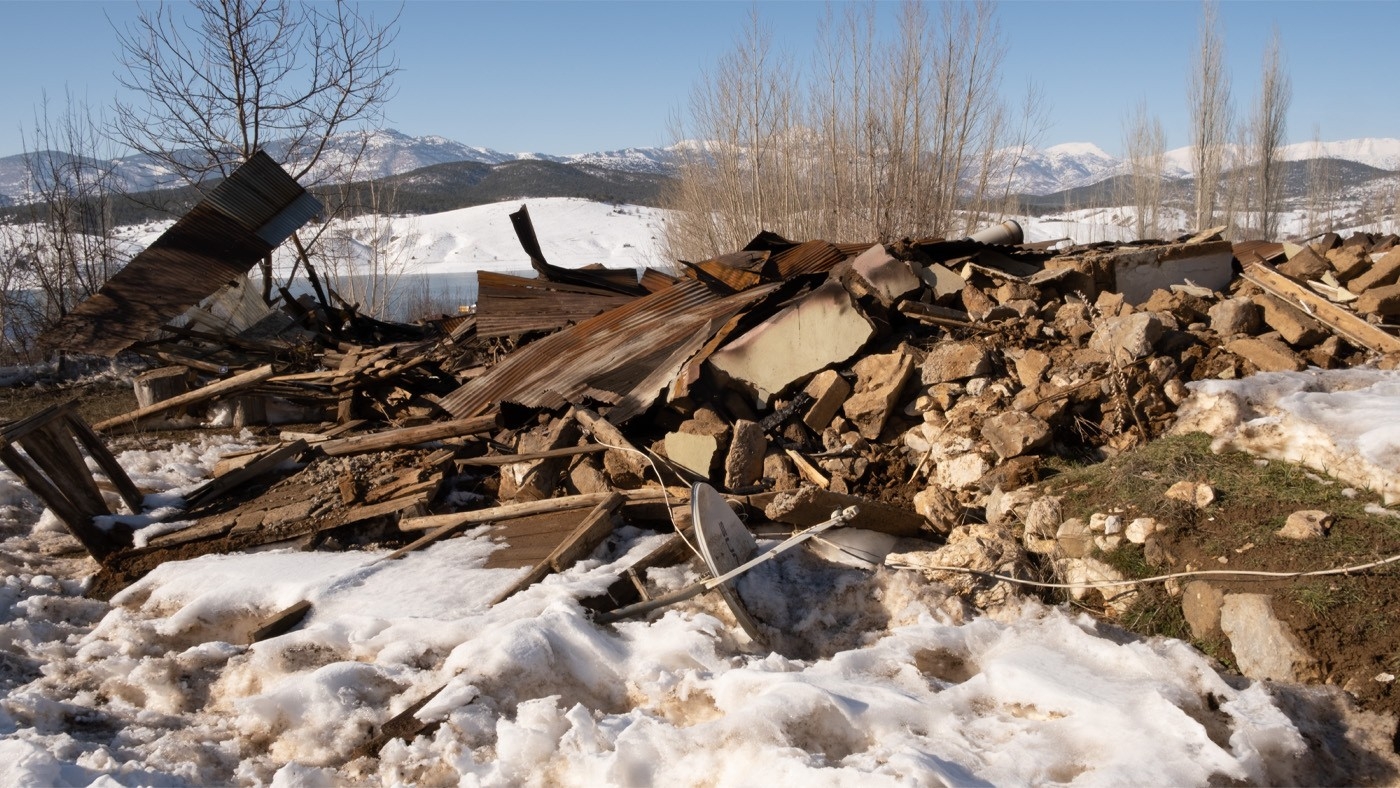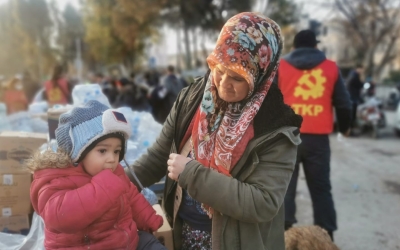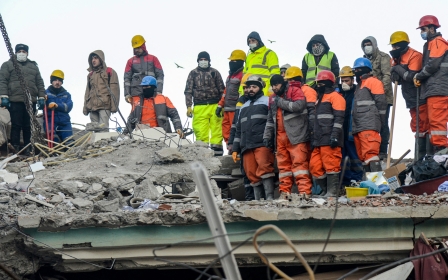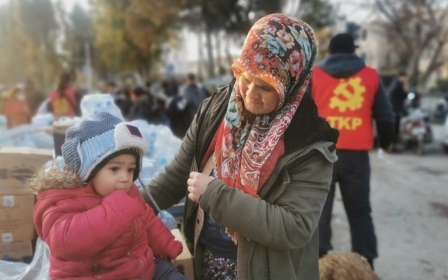Turkey earthquake: Survivors try to salvage what they can as cold weather bites

Weary and frightened survivors are living a hellish nightmare in southern Turkey as they camp outside their former homes now reduced to heaps of concrete and twisted metal.
The stench of dead bodies wafts through the cold air in Elbistan, the epicentre of a powerful 7.5 magnitude aftershock that struck southern Turkey and northwest Syria just two weeks ago.
Hundreds of homes in this picturesque town, which lies on the foothills of Anatolia's snow-capped mountains, were completely levelled on 6 February, some 12 hours after a 7.8 temblor struck the southeast of the country.
'The villagers have no hope. If the government helps, maybe they can do something, otherwise life will be too difficult'
- Halil Kilic, survivor
On Sunday, dozens of survivors could be seen standing next to mounds of debris, waiting for the news of loved ones as hopes of their survival faded.
Others were focused on trying to recover any of their lost savings and valuable belongings, and hacked away at the ground for documents they hoped could help rebuild their lives.
New MEE newsletter: Jerusalem Dispatch
Sign up to get the latest insights and analysis on Israel-Palestine, alongside Turkey Unpacked and other MEE newsletters
"We lost six relatives. We are done with this town," local resident Mustafa told Middle East Eye, as he supervised efforts to recover his damaged belongings.
"We want to build a new life somewhere else."
At least 46,000 people died in both Turkey and Syria on 6 February, but officials have warned the death toll is likely to rise as many still remain unaccounted for.
While survivors continue to be found alive under the rubble, authorities announced this weekend that they were suspending search-and-rescue operations in all but two of the worst-hit provinces.
And with much of the rescue efforts now shifting to help for those that survived, many of the survivors continue to dwell on what happened that fateful day and if anything could have been avoided.
Fateful decision
In the nearby village of Gucuksu, a village elder told MEE that the noticably high death toll in his village was a persistent reminder of what had transpired and what went wrong.
One of the reasons he gave for the high death toll was that many of the residents returned to their homes before the second temblor hit because they couldn't handle standing outside in the sub-zero weather conditions.
"After the first earthquake struck, our village remained sound," Ismail Ozdem told MEE. "But it was so cold that we feared the children and elderly would freeze to death. That's when we decided to go back to our homes."
The decision proved fateful. According to Ozdem, cooking stoves toppled over in nearly every other home, triggering fires which caused some to burn to death.
"We couldn't do anything," Ozdem said tearfully, pointing to the wreckage of a burnt-out house where four people died. "They were burnt alive."
Although many of the survivors now had tents, Ozdem said he feared cold and icy conditions could lead to further deaths.
A villager, who was waiting to hear from the government about promised residential container units, chimed in: "We don't know what to do."
"Our priority is to protect ourselves from the cold," he added, pointing to the snowy mountains to the east.
On Friday, the Turkish government launched a worldwide call for tents and shelters for quake survivors, after thousands across much of the south continued to take refuge in shopping malls, stadiums and mosques.
"We are trying to procure everything we can all around the world and ask foreign governments to prioritise tent aid," an official with knowledge of the effort told MEE.
The pledge came just days after a visit by Turkish President Recep Tayyip Erdogan to the quake-hit area of Kahramanmaras, where he vowed that the state would provide immediate help to the displaced. "We can never let our citizens stay on the street," he said.
'Afraid of an epidemic'
For Ozdem, the village elder, another devastating outcome from the quake was the disappearance of a crucial underground water spring.
Drone and satellite footage has already shown the impact of the quake on local flora and fauna, with an olive grove split in two by an enormous canyon more than 2km wide.
"Our spring water disappeared. It had been flowing for at least 150 years since our ancestors settled here," Ozdem said.
While it was unclear whether the ground water would return to levels seen before the disaster, residents in the nearby village of Ericek said seismic waves had also affected water levels and quality where they are.
"As the earth shook, we think the ground waters changed their course," a municipality worker who was in the village to check on the destroyed sewage system told MEE.
A villager, who tried to keep himself warm next to a open fire, said difficulties in accessing safe drinking water had sparked fears of waterborne diseases spreading.
"We haven't bathed for more than a week, we can't clean ourselves. We're afraid of an epidemic," he said.
Charities such as Oxfam and Save the Children have warned that both Turkey and Syria urgently need to address the dire water situation in order to stave off a humanitarian disaster.
"We are running against the clock to help. The scale of [the] need is massive," said Moutaz Adham, Oxfam's country director for Syria. "It is vital that we stop people dying from preventable disease."
Nearby, a group of young people could be seen rushing to deliver aid to some of the more remote mountain villages, but amid the rescue efforts, the pain was plentiful in Gucuksu.
Halil Kilic, who was huddled next to an open fire, couldn't his despair - even behind thick plumes of smoke.
"It was devastating. That is all I can say," he said as another villager brought up the death of his brother.
"After the first earthquake, which did not damage our village, we thought that it was over. But in the second one, more than 150 houses collapsed and 109 people died."
"Many of the residents burned alive as their kitchen stoves fell and triggered fires."
Rubbing his hands together to keep himself warm, he said that beyond those whose homes collapsed, millions of others across the region now faced the dilemma of whether to risk reentering their homes, wait for structural tests or move elsewhere.
"The villagers have no hope. If the government helps, maybe they can do something, otherwise life will be too difficult."
Middle East Eye delivers independent and unrivalled coverage and analysis of the Middle East, North Africa and beyond. To learn more about republishing this content and the associated fees, please fill out this form. More about MEE can be found here.






